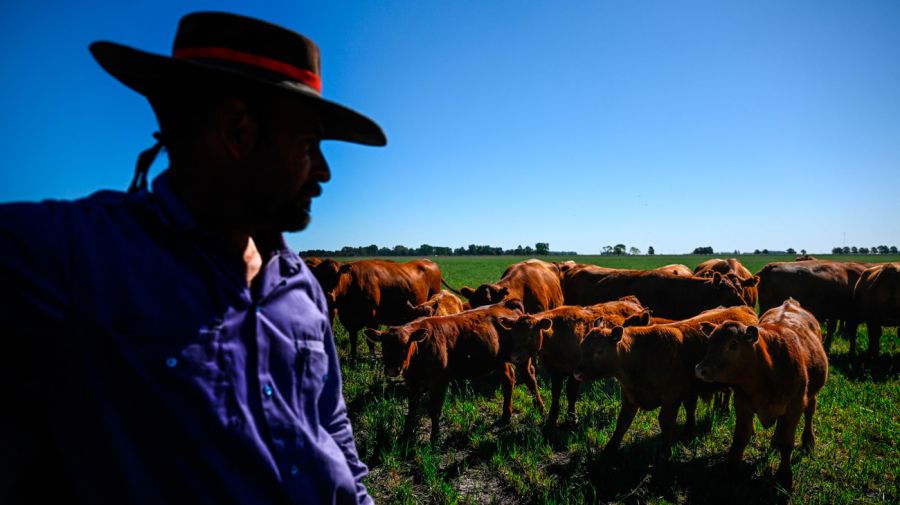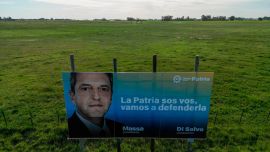Livestock salesman Pablo Cicaré stands among a herd of 200 Angus cows, source of some of the world's finest beef, that he dreams of being able to freely export after Argentina’s presidential election on Sunday.
Here in the pampas, Argentina's vast and fertile grasslands that stretch as far as the eye can see, farmers are fed up with excessive government controls and taxes that have long choked the agricultural industry.
"Business is very complicated. The government has trampled on farmers for so many years. Farmers need to be able to export freely," said Cicaré, a third-generation cattle farmer who says he is against “populist policies.”
He preferred not to say who he would vote for, but in Saladillo, 200 kilometres (125 miles) from the capital Buenos Aires, libertarian outsider Javier Milei led the first-round election. His rival, Economy Minister Sergio Massa, trailed in third place.
Nationally, Massa scored the most votes, despite overseeing annual inflation of 143 percent, and the run-off is expected to be tight.
The dire state of the economy is the main concern of voters weary of repeated fiscal crises, inflation and currency controls.
To control inflation, the government limits the export of agricultural products and strictly controls the exchange rate at which producers can sell their goods abroad.
"I am going to vote for Javier Milei, because I agree with his ideas of more freedom... and letting the market regulate the economy," said 80-year-old dairy and wheat farmer Máximo Russ, near the city of Junín.
"If the entire system is liberalised, exports are opened up, and Argentina opens up to the world ... logically there will be investment, and there will be much more production, and the country will grow much more."
'The lesser evil'
Aside from its famed grass-fed beef, of which it is one of the world's biggest producers, Argentina is also a major exporter of soybean products and wheat.
Agricultural exports make up 10 percent of gross domestic product but if the entire production chain is counted, the industry represents a quarter of the economy
After the country's worst drought in a century saw agricultural exports plummet, leading to a shortfall of US$20 billion in revenue, the industry is expecting an excellent harvest in 2024.
Some fear this boom will lead to even more taxes if Massa wins and takes office on December 10.
While some in the industry are confident in their choice of the eccentric free-market outsider Milei, who has also said he will get rid of the Central Bank and dollarise the economy, others, like Cicaré, are merely choosing "the lesser evil."
"For years we have been voting not for the one we like the most, but for the one who is the least bad," said the 52-year-old farmer.
Political expert Carlos Germano said the agriculture sector found it "very difficult to trust the policies of the ruling party... what the agricultural sector is asking for is predictability."
Historian Roy Hora, who has a doctorate from Oxford University and is academic at the University of Quilmes, said Milei's policies provided some with the belief that there could be "a kind of light at the end of the tunnel."
However, the sparsely populated countryside does not have a huge impact on the outcome of the vote, he said.
And some in the industry are leaning towards Massa as the best option.

Uncertainty
The quiet streets of Saladillo, with its low houses and flowering trees, are oblivious to the ongoing election campaign. There is barely a Massa poster on the road to remind voters the run-off is nearing. There are none for Milei.
"I am so sick of politics," said field manager Javier Sunblad as he overlooked a field of wheat and 400 head of cattle. "I don't like either of them. I like Milei the least."
"Paying taxes is not bad, but only if they are not stolen," said the 62-year-old farmer, who is concerned about the fate of the rural school that can be seen at the bottom of a dirt road.
Milei promotes a controversial payment model for public education that would be "impossible to apply to schools like this one," explained Sunblad.
"It has 22 students, children of farm workers… will it still be open with Milei?" he asked.
Even with the mistrust he feels for the ruling coalition candidate, Sunblad says he leans towards Massa "because in a country with a lot of economic inequality, with 40 percent poverty, there has to be a strong state," he said.
"My wife will vote blank," he said.
For Carlos Achetoni, the president of the Federación Agraria Argentina industry chamber, Milei "is an option, not a choice."
The countryside is voting for him because of "years of aggressive policies," which he summarised as high taxes, export caps and exchange controls.
The gap between the official exchange market and the parallel market, running at more than 150 per cent, is fuelling annualised inflation at 143 per cent.
In 2022, the agricultural sector exported 49.581 billion dollars, 8.5 percent more than in 2021 – vital support for Argentina's indebted economy.
"The countryside has a very important place in public life, it weighs economically in times of difficulties to sustain a cycle of growth," said Hora.
The defeat of opposition presidential candidate Patricia Bullrich, who finished third in the first round and was eliminated, has displaced the countryside "from its natural centre-right position to a more radical, anti-state and anti-tax position," he explained.
"Many producers see Milei as a light at the end of the tunnel,” concluded Hora.
related news
by Sonia Avalos & Elena Boffetta, AFP




























Comments